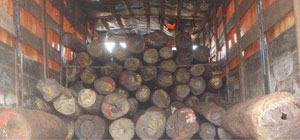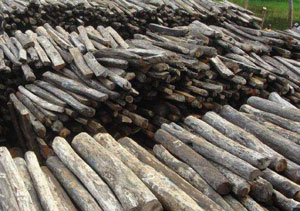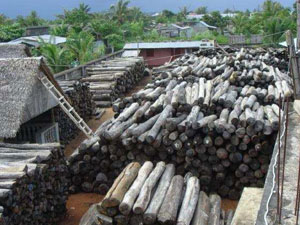Gangs of illegal rosewood loggers continue to pillage the wildlife-rich forests of northeastern Madagascar, reports a local source.
“More and more people are entering the [protected area] to cut wood,” said the source, whose identity has been concealed for protection. “All the rosewood — regardless of its diameter — will disappear.”
The source adds that due to fears of prosecution, local villagers are not directly participating in logging.
   Rosewood |
“Instead, they look for the good trees and then guide the logging teams to the trees.”
The outbreak of logging in the rainforests of northeastern Madagascar followed rangers’ abandonment of park posts during last month’s military coup in Madagascar. Chinese timber traders took advantage of the opportunity, paying armed bands to raid Marojejy and Masoala National Parks — both of which are considered jewels in Madagascar’s protected area system for their astounding biological richness. The loggers’ primary target was rosewood, ebonies, and other hardwoods. It is unclear how much timber has been cut from protected forests since the political crisis began, but photos provided by another confidential source show substantial stockpiles of contraband wood in local towns.
The political crisis in Madagascar — brought on by a conflict between former president Marc Ravalomanana and interim president Andry Rajoelina, who siezed power in mid March — has brought to a near standstill Madagascar’s $400-million-a-year tourism industry. A spate of countries, including Britain and the United States, have warned travelers against visiting the country.
“The 400 million dollar tourism industry has just been leveled, and that means trouble ahead for the forests of Madagascar,” said a local conservationist. “This coup d’etat undermines everything we have worked for for 30 years.”
Conservation in Madagascar is highly dependent on income from tourism. Half of park entrance fees are returned to communities living in and around protected areas. Without this source of income, locals in some areas may be forced to turn to conservation areas for timber, fuelwood, and agricultural land as is beginning with criminal syndicates in Marojejy and Masoala.
Related
Hopeful conservation news emerges out of Madagascar political crisis
(03/31/2009) A bit of hopeful conservation news has finally emerged out of the political crisis in Madagascar, report local sources. Wednesday representatives from several NGOs active in conservation in Madagascar met with a minister from island nation’s new government. The minister said his top priority was putting an end to illegal logging that emerged when rangers abandoned their posts and armed gangs moved into protected areas in the wake of the political crisis.
Conservation groups condemn ‘open and organized plundering’ of Madagascar’s natural resources

(03/30/2009) Eleven conservation organizations—including WWF, CI, and WCS—have banded together to condemn logging in Madagascar’s world renowned parks during a time of political crisis. Taking advantage of the turmoil after interim president Andry Rajoelina took control of the country in a bloodless coup from former president Marc Ravalomanana on March 17th, pristine forests have been plundered for valuable wood, wildlife trafficking has increased, and illegal mining operations have begun say the conservation organizations.